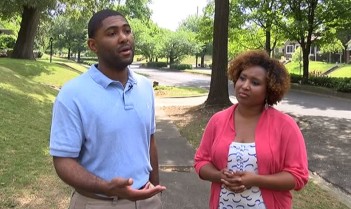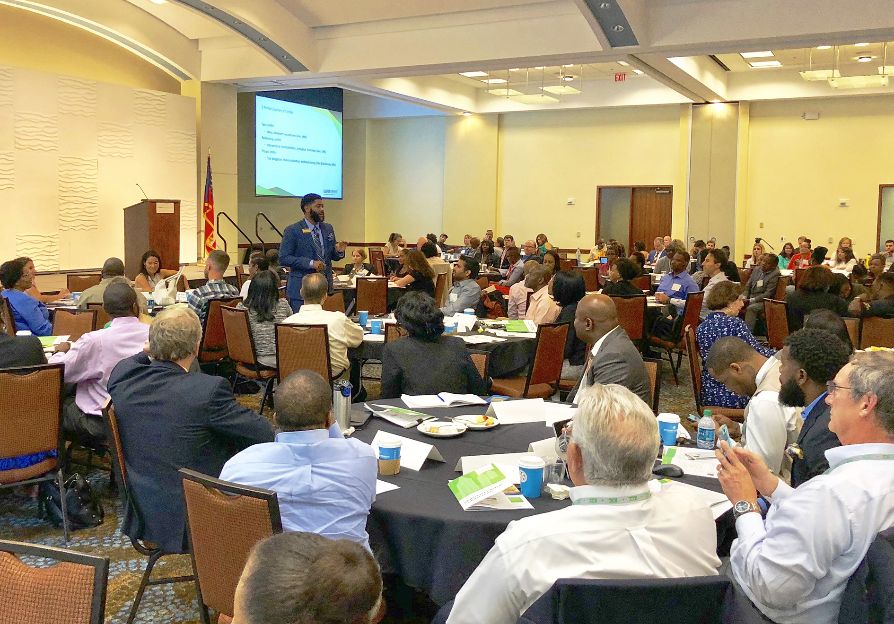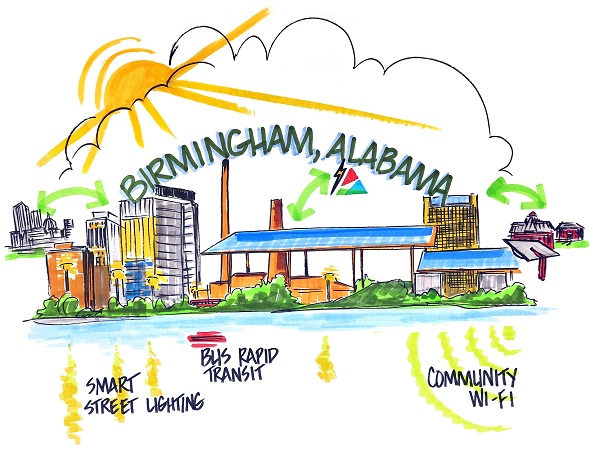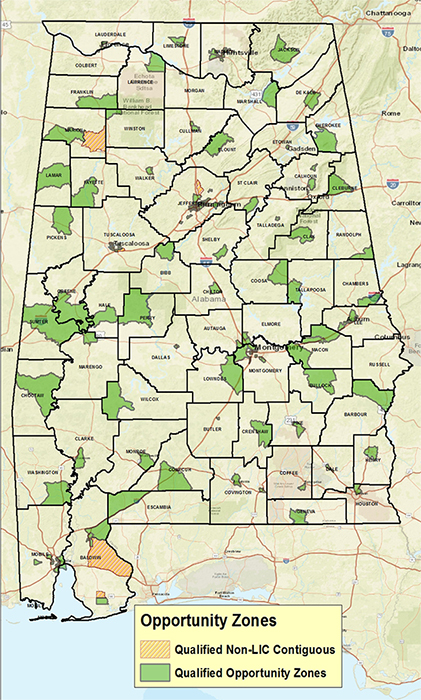We are very appreciative of Steve Crocker and the WBRC FOX6 News team for addressing our efforts to revitalize, reinvest and repopulate our neighborhoods.
The article below can be found on WBRC’s website here: http://www.myfoxal.com/story/29726087/couple-tracks-vacant-homes-in-bush-hills-in-hopes-of-improving-neighborhood.
For more information on NHabit visit us on Facebook at www.facebook.com/nhabited.
BIRMINGHAM, AL (WBRC) –
Lots of people know their neighbors. But few people know their neighborhood like the Hoods.
Not long after Robin and Anthony Hood moved to Bush Hills in 2008, they set off a smoke alarm while cooking a meal and were surprised to find that firefighters were surprised.
“The fire department came and passed by our house, turned around and passed by our house again until I came out and ran down and they were like, ‘Oh, somebody lives in this house! We thought this house was still vacant,'” Anthony Hood said.
Robin Hood heard a similar thread when she started getting involved with the neighborhood association.
“At the meetings the number one thing that would always come up is ‘the vacant property next to me’ or ‘this is blighted,’ it was just so repetitive,” she said.
But during evening walks around the neighborhood they became aware of attractive but vacant homes that were drawing interest from potential buyers but were not on the market, as well as deteriorating eyesores.
Eventually they posed a question.
“What if we tracked all the vacant properties in the neighborhood and got in contact with the owners? Could that help repopulate the neighborhood?” Anthony, a business professor at UAB, said.
The effort to answer those questions became Nhabit Bush Hills. Through walking the neighborhood themselves and aggregating other available data, the Hoods began building a database of the neighborhood’s 1,300 properties including roughly 200 that were vacant.
In 2013 they won a $15,000 Community Health Innovation Award from UAB, using the money to pay students to help canvass the neighborhood as well as computer and camera equipment they used to help build the database.
Shauntice Allen, program director of One Great Community says the CHIA grants seek to encourage unconventional thinking about very real problems Birmingham residents have identified, like mold, pests or other dangers that might reside in vacant or abandoned housing and which could affect public health.
“Are you outside with your kids?” Allen asked. “If you’re not because you don’t feel safe because there are empty homes on your block, that impacts your physical activity opportunities.”
The Hoods say they appreciated the grant not only for the tangible help it provided, but also as a source of validation and encouragement.
Through their efforts, the Hoods have developed a nuanced picture of their community beyond which homes are kept up and which ones are not.
“Every property in this neighborhood has a story,” Anthony said.
But finding the person who knows that story isn’t always easy. Neighbors who did not know the Hoods and who might have been reluctant to offer information found a common purpose.
“People don’t want to live next to a vacant house,” said Anthony. “They’re skeptical until they understand what we’re doing and then they’re forthcoming and often they have contact information for the owner of the property.”
Through their relationships and their aggregating of other available records, the database the Hoods have built shows owners property owners who don’t live in the neighborhood are spread across the Birmingham metro and state and as far away as Oregon, California, Texas and New York.
The Hoods say they have contacted property owners outside the neighborhood by mail, introducing themselves and their effort and asking about possible assistance or if the owners might be willing to sell or donate their homes to a non-profit.
The Hoods say about 20 percent of those contacted have responded.
The Hoods’ own observation suggests some families maintain vacant properties well for some time beyond a homeowners’ moving or passing. However, some responses to their outreach have explained that some homes have deteriorated because residents may be elderly, ill, struggling financially or some combination that leaves them unable to keep up with maintenance.
The Hoods have sought to develop relationships with landlords as well. Robin, Nhabit’s Program Director and head of the neighborhood association’s strategic implementation arm Bush Hills Pride, points out that a rental home or apartment that looks like the landlord walked away from it could actually be a situation where renovation work was upset by vandals or thieves.
“We’re building relationships not only with our homeowners but with our landlords because we want them to know that we care and we want them to reciprocate that,” Robin said.
For all their work, Anthony and Robin have fans at Birmingham City Hall.
“Bush Hills is one of our special neighborhoods,” said Birmingham Mayor William Bell. “We’ve invested a lot of money in that community to help maintain that area and its because the citizens have a sense of pride about their properties. And when someone steps out there and takes on that challenge like the Hoods, we have nothing but respect and want to be as helpful as possible to make their efforts worthwhile.”
Bell said he appreciates the citizen-led nature of what the Hoods are doing and suggests it could be a model for other neighborhoods.
However, the Nhabit Bush Hills effort also brings up an old sticking point the city has struggled with. Under Mayor Bell, the city has developed a Land Bank Authority that can, through an albeit lengthy process, dispose of properties whose owners have failed to pay taxes for five consecutive years.
The goal is to strengthen neighborhoods through selling the properties, donating them to non-profits or even allowing an adjoining property to absorb the offending lot.
But the Hoods say they have learned that while some of the blighted properties appear land bank-ready, the owners continue to pay the taxes, which the mayor says, handcuffs the city.
“We are still trying to find ways through the legislative process that will give us more tools and properties to force property owners to maintain their properties,” said Bell.
“For example if you are not maintaining the property and the city goes out and maintains the property and puts a lien on there before you can pay your taxes or sell the property or do anything with it, you have to address the issue of the liens and address the issue of why you haven’t maintained the property. We’re also aggressively putting in place more inspectors through the inspection process to go out and talk specifically with those owners who are not doing what they need to do,” Bell added.
Birmingham Community Development Director John Colon points out the city did adopt an international maintenance code last year that gives it some new tools, including bringing some city court proceedings dealing with code enforcement out into the actual neighborhoods in question.
The Hoods have also traveled in search of ideas for their neighborhood, attending conferences in other cities seeking solutions to similar issues. Especially with respect to fostering a healthy mix of families in the neighborhood, Anthony said they’ve learned there are no best practices, only better practices.
“There could be a time where this neighborhood is bustling with energy and there are no vacant properties but, did we push out the original people that were here and now people are priced out of the neighborhood? How do you gain transformation of a neighborhood but at the same time be very sensitive and have a real mixed income diverse neighborhood? That’s a challenge as well,” he said.
Anthony and Robin maintain high but realistic hopes for their neighborhood of 80- and 90-year-old homes close enough to downtown to get there without an interstate. They also hope to play a role in bringing vacant properties back to life.
“I think people will see this as a viable place to come and buy property to live and to raise their families,” Anthony said.
Find out more about NHabit Bush Hills on their website, http://nhabited.org/ and Facebook page.
Copyright 2015 WBRC. All rights reserved.





